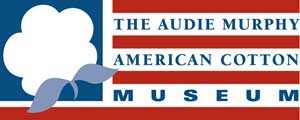By the 1950s, cotton was still an important industry for the county, but mechanization of the industry caused shifts in who was farming. Notably, the number of farms decreased as farms consolidated into larger enterprises and smaller tenant farmers and sharecroppers left the industry and the area. By 1950, the majority of the county farmers that remained owned their land instead of renting as tenant farmers.[1]
While a county record-breaking 66,000 cotton bales sold in 1950, by 1959 cotton farms had significantly decreased.[2] As part of this decrease, farmers also diversified their operations focusing on livestock as cotton sales and prices decreased.[3] As farming decreased as a way of life, the industrialization that occurred during the WWII years brought manufacturing jobs to the county. By 1953, about 2,000 county citizens worked in manufacturing plants.[4]
Over the years, Hunt County managed to have 10 Fortune 500 companies at one time or another. They included Wing Doors, Papermate, Rubbermaid, Lance, Henson-Kickernick, Walker Manufacturing, L3 Harris (previously Temco, LTV, E-Systems, Raytheon, and L3), Cytec, Fleishmann’s Yeast and Case.
[1] https://www.tshaonline.org/handbook/entries/hunt-county
[2] https://www.tshaonline.org/handbook/entries/hunt-county
[3] https://www.tshaonline.org/handbook/entries/hunt-county
[4] https://www.tshaonline.org/handbook/entries/hunt-county

Mary of Puddin Hill
The story of the Puddin Hill Country Store began in 1839, when James and Mary Horton came to the Blackland Prairie of Northeast Texas. Mary Horton was said to have had difficulty walking up a hill through the mud, which she said was as thick as pudding. Accordingly, Mary Horton became the first Mary of Puddin Hill. It was her recipe for pecan fruit cake that was passed down through the family and later made the company famous.
In 1948, Mary’s great granddaughter, Mary Horton Lauderdale, and her husband Sam were students at the University of Texas. Mary was a home economics graduate and Sam was a G.I. Bill chemical engineering student. “The G.I. Bill allowed us $90 a month and we were hungrier than that”, recalled Mary. “There she made 500 pounds of fruitcake and sold it all at a profit. During the Christmas season of 1949, while still students, they began making and selling fruit cakes in their apartment, based on her grandmother’s recipe.
Sam and Mary decided to return to Mary’s hometown of Greenville and give the business several years of all-out effort. They converted the laundry room at Mary’s parents’ home into a small bakery and went to work. The business grew and they were able to purchase a few acres of the original Puddin Hill farm on which they built the current facility in 1955. They added a retail store in 1975 and a candy kitchen in 1980. In 2014 Mary of Puddin Hill closed but the following year Elenberger’s Bakery of Palestine bought the name, recipes, and equipment. In 2020, Luanne Dickens formed an agreement to bring a Mary of Puddin Hill store back to Greenville. It is located downtown and called Luanne’s Mary of Puddin Hill.

Innovation First International
Innovation First International (IFI) was founded by Tony Norman and Bob Mimlitch in 1996 in Greenville. IFI began by producing electronics for autonomous mobile ground robots and is now a leader in educational and competitive robotics products and a growing developer of consumer robotics toys. They were founded on the belief that innovation is necessary very early in the design process to produce simple and elegant product designs. Innovation First’s subsidiaries include VEX Robotics, Inc., RackSolutions, Inc., and Innovation First Labs, Inc. They design and supply control systems to the largest educational robotics competitions worldwide. The VEX Robotics Design System is the leading classroom robotics platform designed to nurture creative advancement in robotics and knowledge of science, technology, engineering and math education. They launched the HEXBUG line of consumer robotics toys in 2008. The RackSolutions division was formed in 1999 with the goal of becoming the “Rack Mount Problem Solvers.” They work closely with all the major computer OEMs (Original Equipment Manufacturer) to provide custom mounting solutions and industry-wide rack compatibility for data installations of all sizes.



Recent Comments